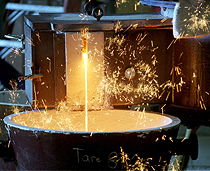 NETL is internationally recognized for its leadership in designing, developing, and deploying advanced materials for use in energy applications and extreme service environments. Of particular note is NETL’s ability to design, engineer, and evaluate materials at size and time regimes ranging from atomistic to pilot-plant scales. To accomplish this, NETL utilizes a one-of-a-kind suite of computational and experimental methods for translating new material science concepts into practical technologies.
NETL is internationally recognized for its leadership in designing, developing, and deploying advanced materials for use in energy applications and extreme service environments. Of particular note is NETL’s ability to design, engineer, and evaluate materials at size and time regimes ranging from atomistic to pilot-plant scales. To accomplish this, NETL utilizes a one-of-a-kind suite of computational and experimental methods for translating new material science concepts into practical technologies.
This unique competency is responsible for the development and implementation of a number of energy and commercial technologies including:
- a corrosion-resistant refractory brick used in nearly all slagging gasifiers worldwide;
- an award winning computational method to optimize heat-treatments of large-scale casting from complex heat-resistant alloys—an enabling technology for manufacturing Advanced Ultra-Super-Critical steam turbines;
- the BIAS class of regenerable, cross-linked, amine-silica sorbents that has been applied to removing pollutants (CO2) for flue gas stream, removing contaminates (such as lead) from water, and extracting rare earth elements (REEs) from power plant and coal processing by-products;
- alloy-based metal catalysts and electrochemical technologies that convert power plant waste streams such as CO2 into valuable fuels and chemicals;
- cathode infiltration technologies that increase the service lifetime of commercially-available solid oxide fuel cell systems;
- a world-leading radiopaque alloy for medical coronary stents;
- a multifunctional sorbent technology for contaminant removal in HVAC systems
Functional Materials development focuses on the design, synthesis, physical characterization, and performance testing of the nanomaterials, polymers, porous sorbents, ionic liquids, and electro-ceramics required for the next generation of carbon capture, gas separation, chemical looping, solid oxide fuel cell, chemical sensing, fuel processing, and carbon materials technologies. NETL also has capabilities for designing, developing, and prototyping magnetic alloys that improve the performance of power converters and the electrical grid. The functional materials capability houses a full complement of chemical synthesis laboratories; vapor-phase deposition equipment for materials growth; crystallographic and electronic structure characterization tools; surface science, imaging, and analysis instrumentation; mineral processing and separation laboratories; membrane manufacturing and testing facilities; and sensor manufacturing and testing facilities.
Structural Materials are being developed for use in extreme environments associated with combustion, turbine, gasification, drilling, and other applications. Research focuses on developing cost-effective materials that can withstand a combination of mechanical stress, and corrosive and erosive environments for upwards of 100,000 hours of service life. This is accomplished through improving existing alloys, designing new materials, and reducing manufacturing cost. Research also investigates corrosion, wear, hot-corrosion, oxidation, creep, and fatigue resistance. Expanding the knowledge base on these topics will enable researchers to develop materials that resist degradation in severe service environments and new models for service life predictions. Research facilities include: The Severe Environment Corrosion and Erosion Research Facility and related laboratories for assessing materials performance in simulated fossil fuel environments at high temperatures and high pressures; capabilities for fatigue and creep testing; laboratories for small-scale production and evaluation of refractory ceramic materials and facilities for melting, casting, forging, rolling, and heat-treating materials from a few grams to 100 kilograms
The MEM capability also includes state-of-the-art analytical instruments and laboratories necessary for complete materials characterization. This includes: optical microscopy, scanning electron microscopy, Transmission electron microscopy, confocal scanning laser microscopy, microprobe, X-ray diffraction, wavelength dispersive x-ray fluorescence, inductively coupled plasma, laser ablation mass spectroscopy, fourier transform infrared spectroscopy, raman scanning tunneling microscopy, atomic force microscopy, scanning tunnel spectroscopy, X-ray photoelectron spectroscopy (with reaction chamber), Brunauer-Emmett-Teller, thermogravimetric analysis, differential thermal analysis, differential scanning calorimetry, laser flash diffusivity, dilatometry, computed tomography scanning, etc.,
Doing Business with Us
NETL welcomes opportunities to work with academia and the private sectors to develop and commercialize energy and environmental technologies. We frequently use Cooperative Research and Development Agreements (CRADAs) with the private sector. We also enter into license agreements for applying our inventions, and we make our laboratories and scientists in available for work-for- or work-with-others arrangements.
Advanced Alloy Development Research
Alloy Development Capabilities




 NETL is internationally recognized for its leadership in designing, developing, and deploying advanced materials for use in energy applications and extreme service environments. Of particular note is NETL’s ability to design, engineer, and evaluate materials at size and time regimes ranging from atomistic to pilot-plant scales. To accomplish this, NETL utilizes a one-of-a-kind suite of computational and experimental methods for translating new material science concepts into practical technologies.
NETL is internationally recognized for its leadership in designing, developing, and deploying advanced materials for use in energy applications and extreme service environments. Of particular note is NETL’s ability to design, engineer, and evaluate materials at size and time regimes ranging from atomistic to pilot-plant scales. To accomplish this, NETL utilizes a one-of-a-kind suite of computational and experimental methods for translating new material science concepts into practical technologies. Technology Area Contact:
Technology Area Contact: